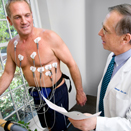Trusting the Treadmill Stress Test
View All Section Pages

Kenneth H. Cooper, MD, MPH, Founder and Chairman of Cooper Aerobics, was the first physician in Dallas to begin using the treadmill stress test as a way to determine cardiovascular fitness and identify possible coronary artery disease. To date more than 112,000 patients have experienced the treadmill stress test at Cooper Clinic.
The treadmill stress test can yield more value than some high-tech tests. John Ho, MD, a cardiologist at Cooper Clinic, explains it’s useful for assessing not only your heart health, but also your fitness level and autonomic tone—the ability of your nervous system to respond to stress by making appropriate adjustments in bodily functions, including heart rate and rhythm.
Dr. Ho has identified four additional factors that can also be measured—simply and safely—at the time of treadmill stress testing. “The most surprising thing,” he says, “is that it turns out each one adds predictive value.” In other words, the more factors measured the better job the treadmill stress test does of predicting a person’s risk of dying prematurely. What exactly is measured during a treadmill stress test? Here are the five main factors:
-
Resting heart rate: The number of times your heart beats per minute.
-
Maximum heart rate: The number of times your heart beats per minute during vigorous exercise.
-
Fitness level: How long you can keep exercising vigorously on the treadmill.
-
Electrocardiogram (EKG): Before, during and after the stress test, an EKG is taken to assess the heart’s conduction system and function. It measures the heart’s electrical impulses.
-
Recovery heart rate: How much your heart rate declines in the first minute after exercise.
As you exercise, your body requires more oxygen to fuel all that work, so your heart needs to pump more blood to transport the oxygen. A treadmill stress test can indicate whether enough blood is flowing through the arteries that supply your heart. It also can gauge your overall fitness level, which helps determine the type and intensity of exercise appropriate for you.
Not Just for Heart Patients
You don’t have to be a heart patient to benefit from treadmill stress testing. Dr. Ho conducted a study including more than 25,000 men and women who were free of known heart disease at the outset. Only 2 percent had an abnormal EKG during the treadmill stress test. Yet the other factors still predicted death from all causes and from heart disease over the next seven years.
Over the years, Dr. Cooper has seen the prevailing medical opinion of treadmill stress testing evolve from skepticism to enthusiasm—and more recently, to lagging interest as new tests with more bells and whistles were introduced. Concerns also have been raised about the accuracy of treadmill stress testing when used to look for heart disease in people without symptoms, especially women.
But Dr. Cooper’s own enthusiasm has never wavered, “Treadmill stress testing is a simple, affordable test that can be done very routinely,” Dr. Cooper says.
Don’t Sweat the Stress Test
One advantage of treadmill stress testing is its impressive safety record. Unlike some more technology-intensive options, it is noninvasive and doesn’t involve radiation or injections. As Dr. Ho puts it, the biggest risk is “falling off the treadmill.” When used to screen people without symptoms, the chance of having a heart attack during the test is extremely low—but medical personnel are always on hand in case anything unusual happens.
One of Dr. Cooper’s 8 Steps to Get Cooperized™ is to get a comprehensive physical exam annually. The only way you can improve your health is if you have an in-depth picture of the current state of your health.
Dr. Cooper advocates treadmill stress testing annually for all men over age 40 and women over age 50 who want to get involved in a vigorous exercise program—even those without heart risk factors. “It’s a very good screening test, and I’ve seen it save a lot of lives,” says Dr. Cooper.
To schedule a comprehensive preventive exam with a treadmill stress test at Cooper Clinic, click here or call 972.560.2667.